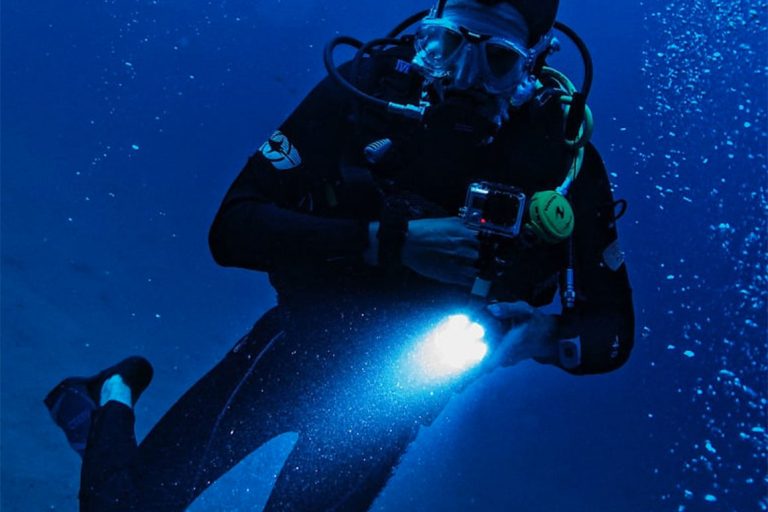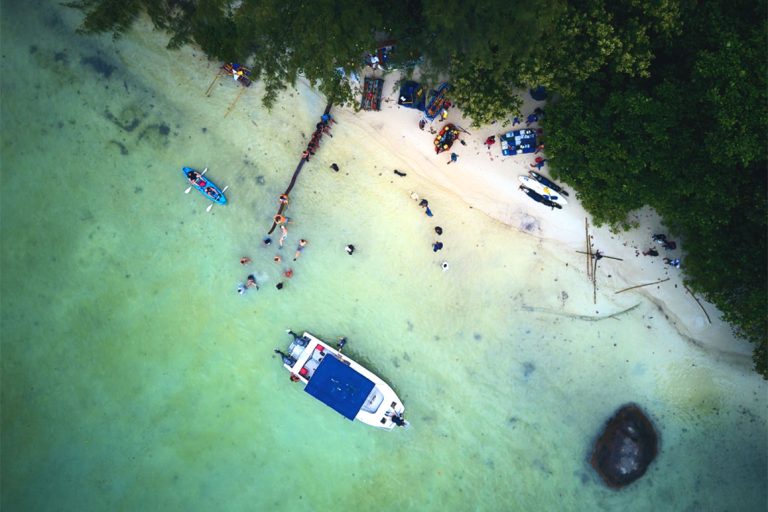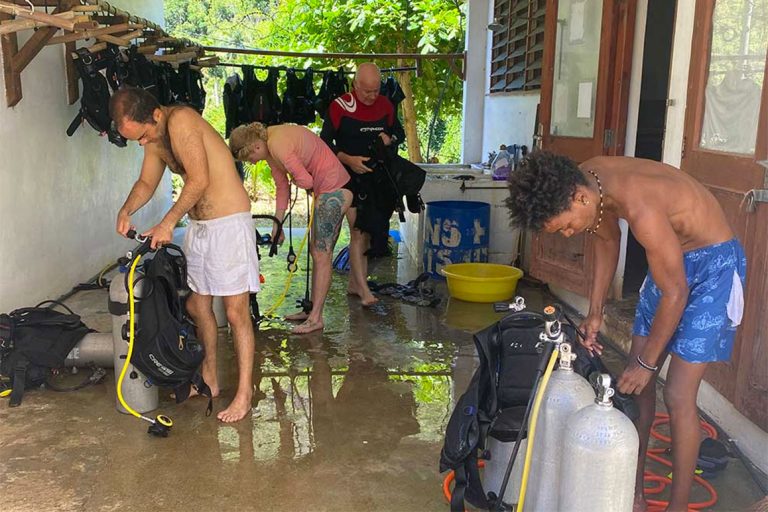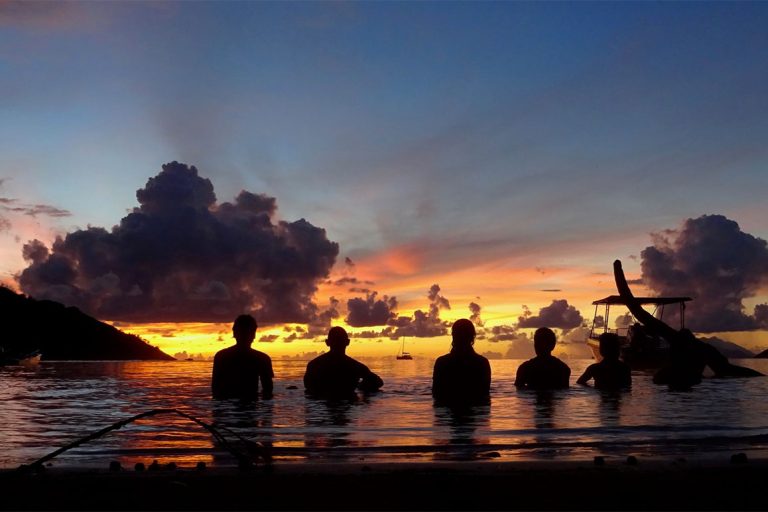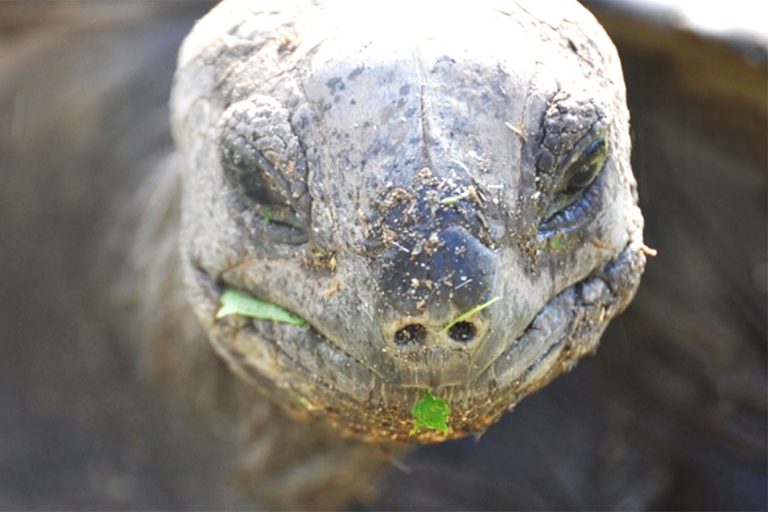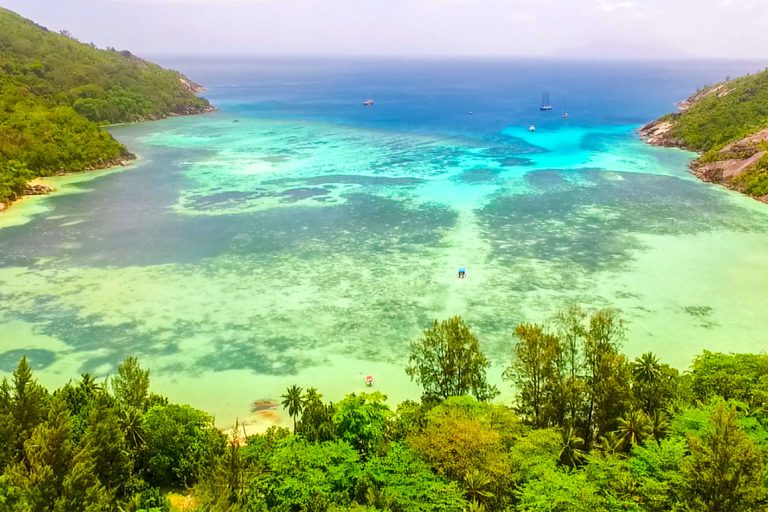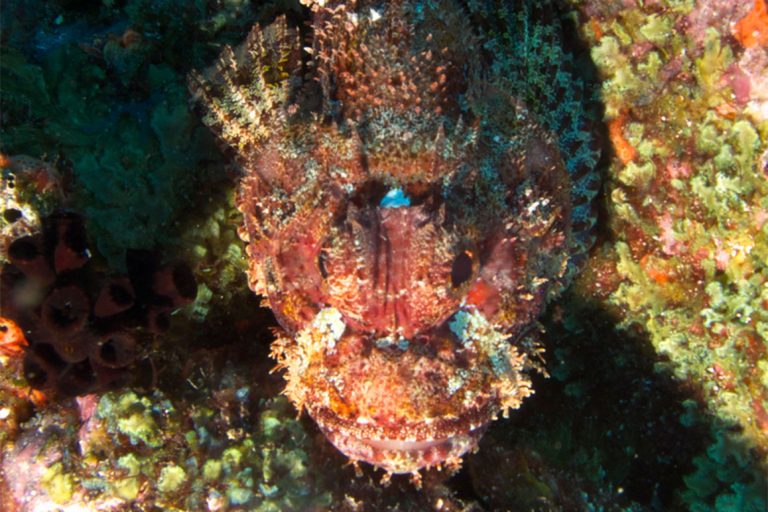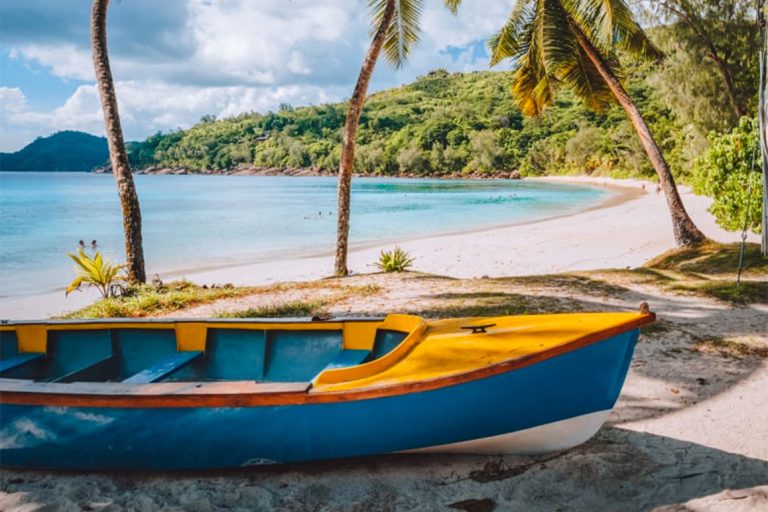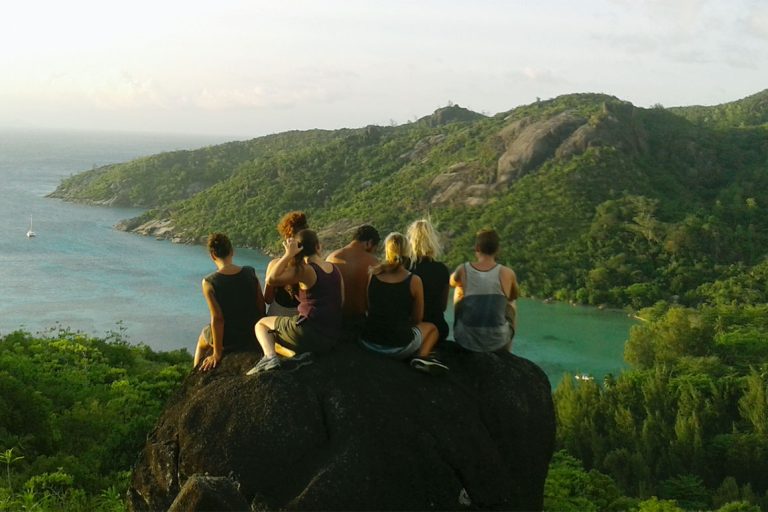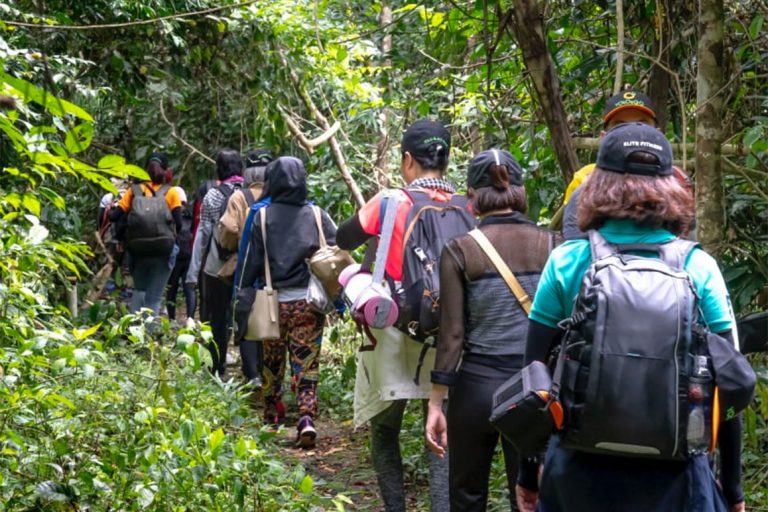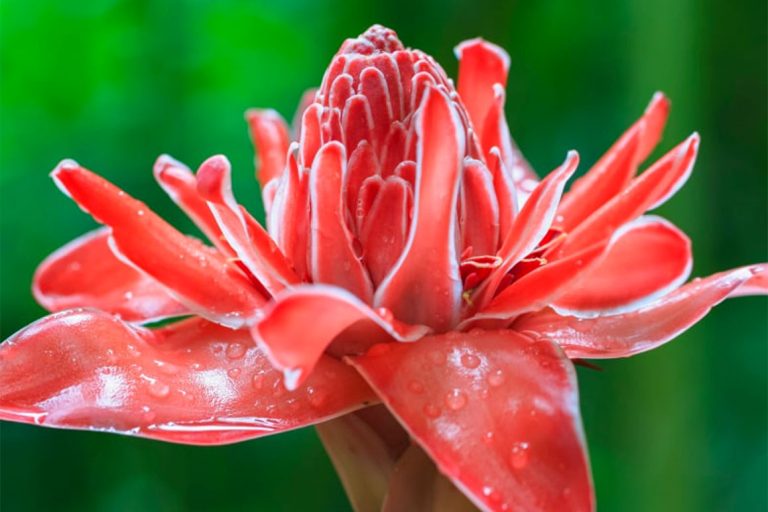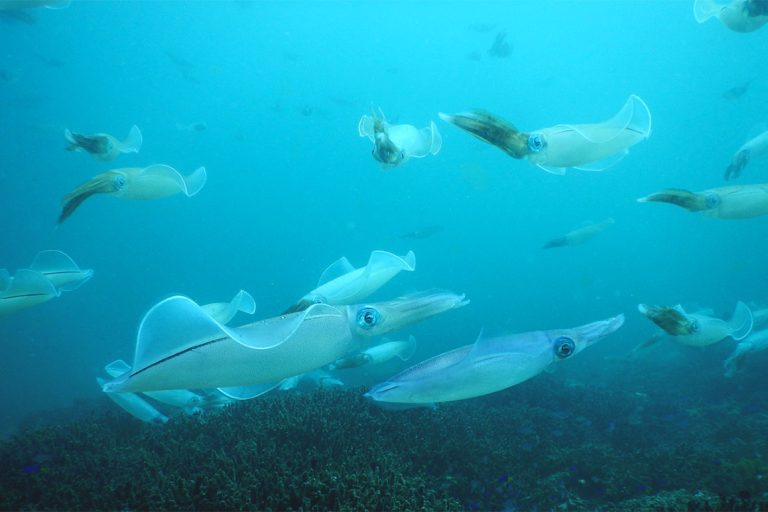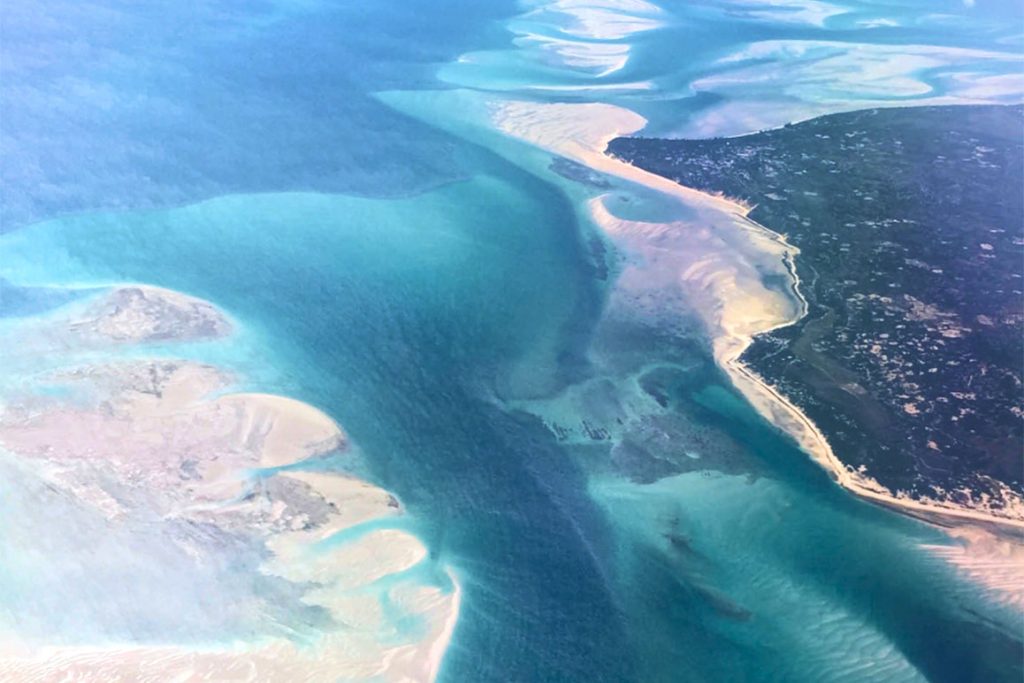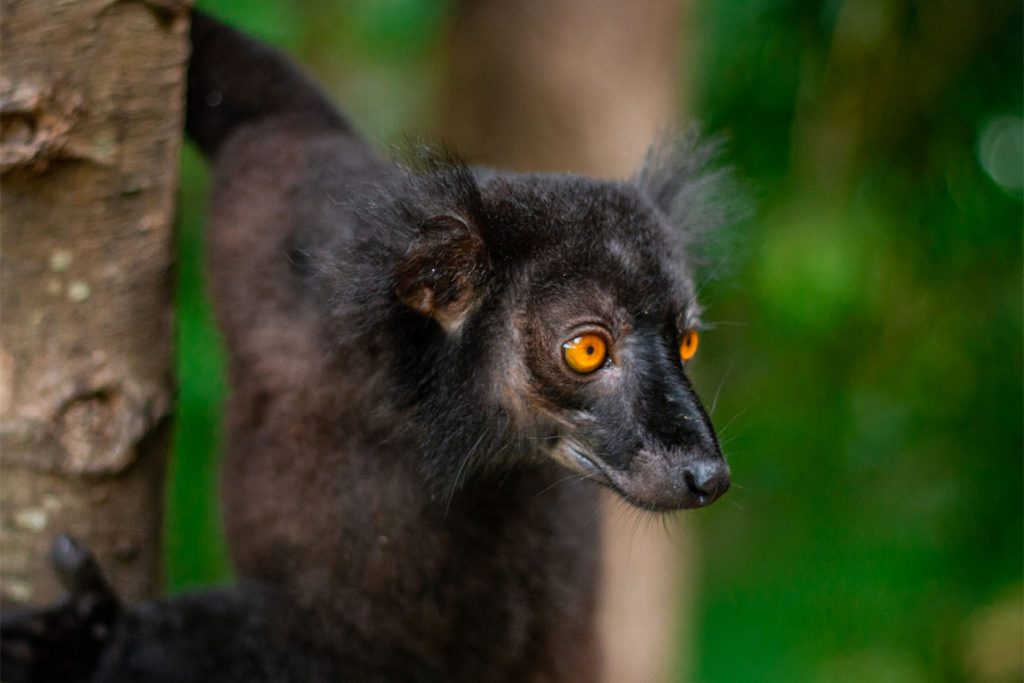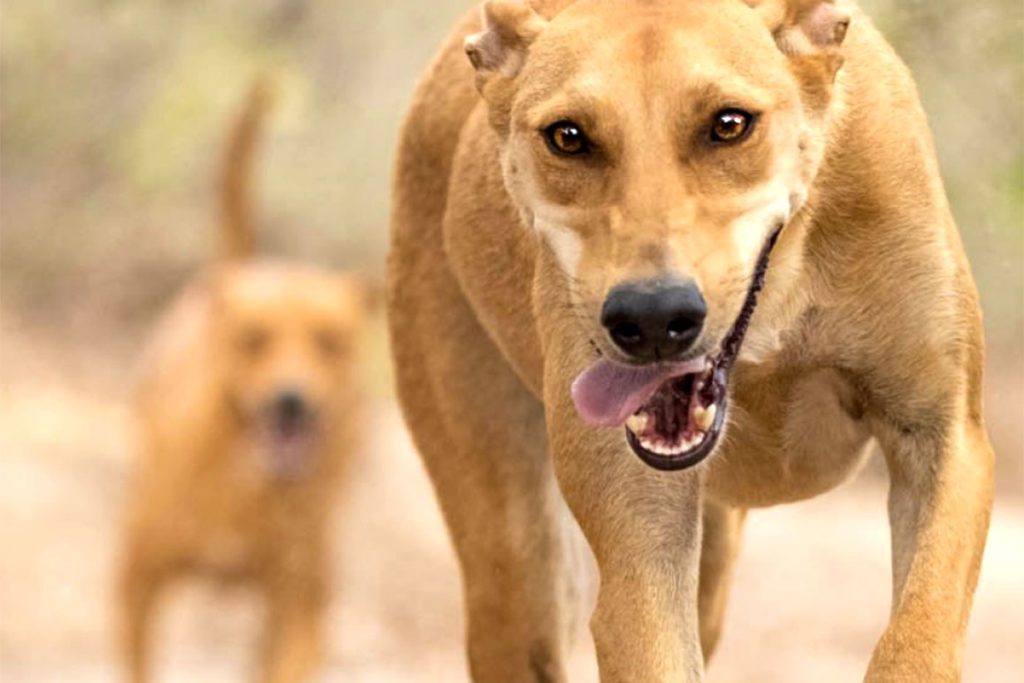- Overview
- Itinerary
- Rates
- Accommodation
- Included
- Excluded
- Flights
- Sustainability
- Gallery
Explore marine conservation while extending your scuba skills
Embark on an expedition to Cap Ternay on the Seychelles island of Mahe. Get your PADI Reef Ecosystem Diver (RESD) Specialty qualification while working on critical marine conservation projects. Your research will contribute towards providing data to the local government on various conservation initiatives. Partnerships like these highlight the connection between social, environmental issues, and community development in the islands.
Note that due to time constraints, you will need to be Open Water Advanced certified before embarking on this expedition.
During your stay, you'll receive the PADI Reef Ecosystem Diver (RESD) Specialty segment of the PADI Divemaster course. This unique offering by GVI & PADI teaches you about best practices when conducting underwater coral reef surveys. For non-divers wishing to attend, we can recommend local dive centres that will help you qualify to PADI Open Water and Advanced levels before your intended start date (this beginner course usually takes 2 to 3 days as you need to complete the theory classes and dives).
What to expect on this unique marine conservation expedition
On this 15 day, 14 night expedition, you'll join hands-on marine conservation experiences. Here’s a glimpse of what you can expect:
- Find science and adventure: Explore the open seas while you learn how to identify fish, coral, and invertebrates as part of a research team conducting daily coral reef surveys.
- Find a diver’s paradise: Explore dive sites among the tropical islands of Seychelles and experience incredible local marine megafauna like turtles, sharks, rays and dolphins.
- Be part of the real deal: Contribute to ongoing environmental projects that address critical challenges aligned to the SDGs (United Nations Sustainable Development Goals).
- Join ethical initiatives: Collaborate with local conservation partners and qualified professionals to ensure your efforts are ethical, meaningful and sustainable.
- Experience unreal adventures: Venture outside typical travel itineraries to get exclusive access to extraordinary remote habitats, rare species and unique ecosystems.
- Make friends for life: Share epic experiences with like-minded changemakers from all over the globe, sharing adventures and working together to protect our planet.
- Enjoy a hassle-free, safe trip: With expert local staff and 24/7 support every step of the way, you can relax and have a stress-free travel experience.
- Take a break: Disconnect from the digital world and reconnect with nature, yourself, and your purpose.
See the itinerary for an example of what you can look forward to >
Physical rating: 4/5.
Moderate physical activities are included and a good level of fitness is required.
No two days are the same in the Seychelles
Each day holds its own suspense, adventure and surprises. But one thing is guaranteed – magic. Every day on your expedition will be a combination of exciting marine activities, conservation research experiences, and relaxation. Greet each sunrise with a hot cup of coffee or tea. Head out for your morning activity, then enjoy breakfast back at the lodge followed by free time to lounge around, read a book or take a nap. At the end of each day, you’ll enjoy a delicious meal together and sit around the campfire to share stories under the stars.
The actual itinerary for this expedition will be structured around your required dates after submitting the enquiry form. In the mean time, below are some important impacts that your participation on this Expedition will have.
Itineraries
Impact 1
SDGs

Prior to your arrival on base, you will be educated about the United Nations Sustainable Development Goals (UN SDGs). Then once you arrive on base, you’ll learn about the specific goals we have in this particular location, our various objectives, and also clarification of how your personal, shorter-term involvement contributes to these.
Our aim is to educate you on local and global issues, so that you continue to be an active global citizen after your expedition, helping to fulfil our mission of building a global network of people united by their passion to make a difference.
The SDGs that this expedition aims to support are:
Goal 4: Quality Education
Goal 12: Responsible Consumption and Production
Goal 13: Climate Action
Goal 14: Life Below Water
Goal 15: Life on Land.
Impact 2
Corals and fish surveys

At over 20 sites across the north-west coast of Mahe, GVI staff and participants use the protocols of Reef Care International in order to survey the reefs. These surveys include noting the health of existing coral, evidence of new young coral growing on the reef, the presence, abundance and diversity of fish and invertebrate species, and select species sizes. Data on coral recovery as well as fish abundance and diversity is passed on to the SPGA to assist with their management and legislative decisions, which might include updates to policies, expanding currently protected areas, or protecting additional areas from overfishing.
For example, sea cucumbers are profitable, so we monitor them to assist our partners in making informed science-based decisions. In addition, we use a different citizen science coral monitoring technique to provide data to CoralWatch, a worldwide coral monitoring methodology based at Queensland University, Australia, which aims to monitor coral bleaching and recovery events around the globe.
Sharing our long-term monitoring data to SPGA allows them to better track and monitor changing reef dynamics and the potential recovery of coral species and coral reef associated species. This partnership provides invaluable data which is then used to petition for science backed policy changes to better protect the reefs and marine life in the Seychelles.
Impact 3
Commercial marine species surveys

Unsustainable fishing is also a threat to the health of the Seychellois marine life. This affects the well-being of the local community (many of whom rely on fish for daily subsistence), and the growth of the local economy (seafood from the Seychelles is exported and sold to international visitors to the islands). Its underwater treasures are another reason why many people visit every year, bringing capital into the country. We assist the Seychelles Fishing Authority (SFA), through our partnership with SPGA, with monitoring commonly harvested species like octopus, lobster, and sea cucumber populations.
Impact 4
Marine megafauna sightings

Incidental sightings of marine megafauna like reef sharks and sea turtles occur frequently during dives, and this information is noted and passed on to the Ocean Biogeographic Information System or OBIS Seamap, an online database designed to keep track of various large marine species around the world.
Impact 5
Island fauna and flora surveys
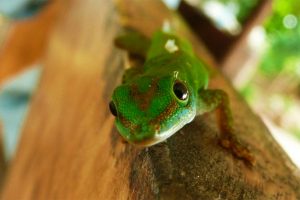
• Invertebrates: monitoring species composition, diversity and abundance of species along the coast and in the shallow water system.
• Seagrass and sharks: conducting shallow water surveys to monitor seagrass ecosystems and track shark pups.
• Mangrove ecosystem: collecting data on the composition, diversity, abundance and zonation patterns of mangroves.
• Local birdlife: conducting surveys on the composition, diversity, abundance as well social, mating, hunting, habitat selectivity and nesting behaviour of local bird species.
• Amphibian and reptile: monitoring species composition, abundance and diversity of reptile and amphibian species.
• Invasive species: tracking invasive species spread and its impact on negative flora and fauna.
Impact 6
Marine plastic pollution cleanups
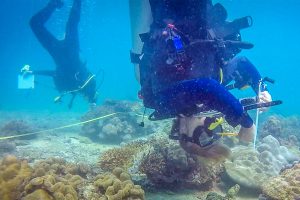
Beach cleans and ocean floor cleanup dives are also regularly conducted as part of the Dive Against Debris (DAD) initiative. For DAD, we dive to pick up marine fishing gear and ghost nets (these account for more than 50% of all marine trash worldwide) as well as discarded plastics and general waste. The data about types and amounts of marine plastics collected is sent to Project AWARE, an organisation established to monitor the abundance and diversity of marine debris around the world.
Impact 7
Environmental education

Environmental education is also important. The main aim of this program is to get members of the local community involved in discussions around issues affecting their marine environment. A new program called the LEAP Project (Locally Empowered Area Protection) has been established with our partner Nature Seychelles and aims to enhance coastal and marine socio-ecological resilience and biodiversity conservation in the Western Indian Ocean. With a much higher level of community engagement and involvement with local groups, such as schools and other environmentally focused local NGOs.
$3,845* USD per person for the full trip duration
*Valid to December 30, 2024. This daily rate is an indication only as prices may vary according to your specific requirements. A quotation for this trip will be emailed to you after submitting the Trip Enquiry.
2025 rate: $4,095 USD per person - valid January 01 to December 30, 2025.
Terms: All bookings are subject to availability and single supplements may apply.
GVI Cap Ternay Research Station
A short three-minute walk from the beach, GVI's Cap Ternay research station is based in Baie Ternay Marine National Park, a picturesque location with tropical weather. With a thirty-minute walk to the nearest village and shop, our base is in a protected and secluded area. It almost feels like we have a private beach all to ourselves (the road ends at the base). The variety of marine life makes this an amazing location – you can see a plethora of life around the island and in the sea, such as reef sharks, dolphins, eagle rays, tropical fish, endemic birds and interesting coastal creatures and critters.

Originally a school, the building has been transformed into an environmentally-aware research station with classrooms for presentations, a library containing marine identification books and resources, and a recreation room to relax in after a day of diving.
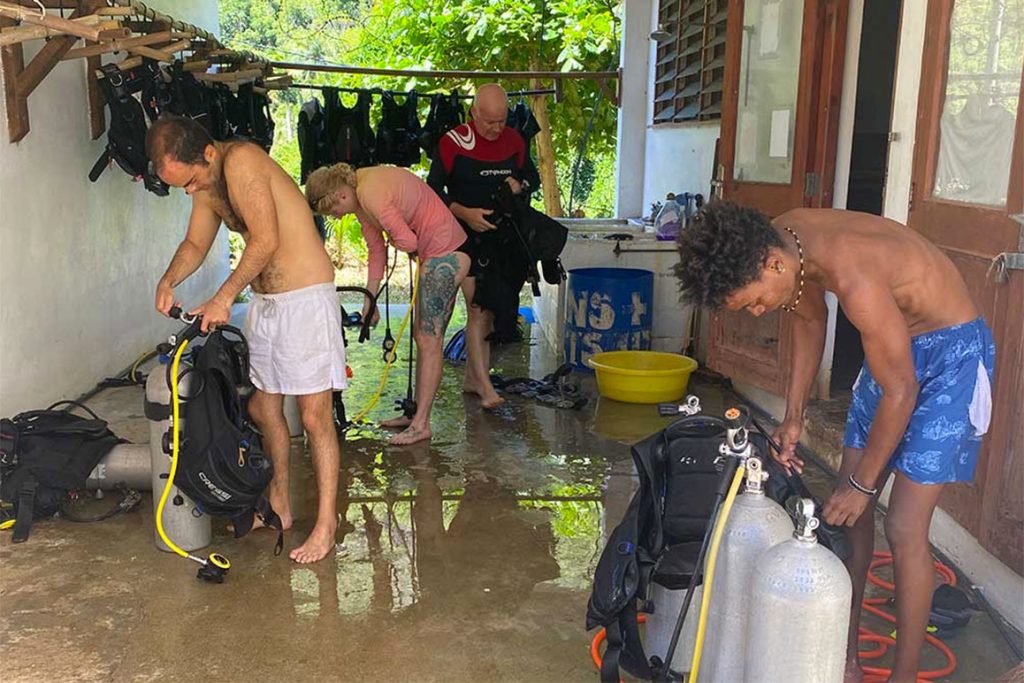
There are also giant hammocks (for more relaxation) and a large grassy area for volleyball. We also have party and BBQ themed nights, and enjoy film and documentary nights in the rec room cinema. Outside in the seating area, participants like to sit and play cards, or just enjoy the weather. Life on base is much like a big family and we share cooking, cleaning, and dive operation duties on a rotation basis.
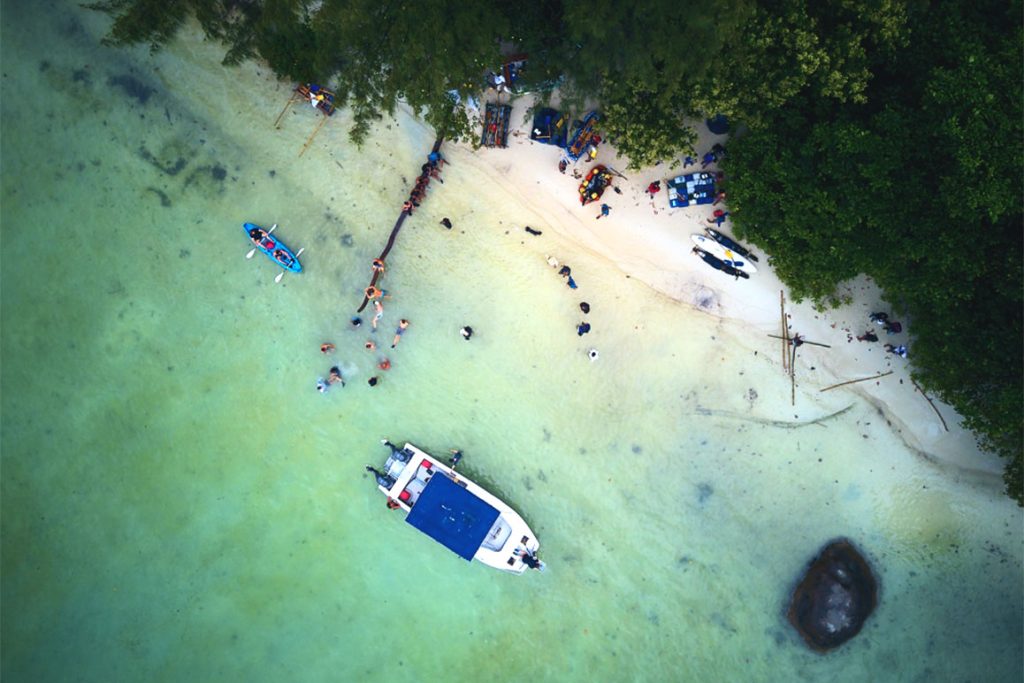
Being an eco-minded base, there is a recycling area on base, and planters for growing local endemic plant species, which utilise the harvested rainwater. It’s great when participants bring their own ideas and get involved with more eco-friendly practices, such as ecobricking and non-recycling storage methods.
Days start early, with boat or coastal equipment preparations or training, and end with dinner, followed by an evening debrief where we share with the group all the exciting things we have seen, and go through the schedule for the next day. After this, it’s time to relax, take in the beautiful sunset, and share stories. There are also a number of base dogs (who love lots of attention) to keep you company. If you’ve joined a diving program and have completed your intensive survey and dive training, you’ll enjoy short boat trips to nearby dive sites.

Depending on the weather conditions and schedule for the week, dives take place once or twice daily, five days a week. On other days, you’ll either conduct marine debris surveys or environmental education sessions including awareness raising with the local community members, depending on the needs of the project at the time. Staff will often deliver presentations throughout the week, with study time included in the daily schedule.
For island conservation and wildlife programs, you’ll head out after breakfast to help with surveys, either by snorkelling, hiking or doing beach patrols. Depending on the conservation projects at the time, you might collect data on nudibranchs, island birds, crustaceans, mollusks or seagrass, to name a few.
- Conservation activities
- All project equipment
- GVI Experiences
- Accommodation (see tab)
- All Meals
- Pre-departure support
- 24-hour Emergency desk
- Arrival and departure transfers.
- Flights (see tab to book flights)
- Visas
- Vaccines
- Medical insurance
- Travel insurance
- Personal belongings insurance
- Cancellation insurance
- Personal gear and kit
- Soft drinks and alcoholic beverages
- Additional spending money
- Gratuities.
You will need to book your own flights to and from Seychelles International Airport (SEZ) located on the island of Mahé near the capital city of Victoria. Our handy airline aggregator will find the best seat prices for your dates.
Note:
- We strongly advise waiting to book your flight until your Expedition trip is confirmed, as we need a minimum number of participants to proceed.
- You can always come back to this tab and book flights later.
- If you decide to book flights earlier, please opt for flexible tickets to accommodate potential changes.
- If you use this service delivered by Travelstart and / or if you buy your ticket through this portal you are agreeing to the Travelstart Privacy Policy and Terms and Conditions. Your agreement regarding flights will be between you and Travelstart or as per their terms and conditions.
- As Naturecrazi is providing this flight portal as a service we are not responsible for any loss, damage (including loss of profits or consequential damages), injury, illness, harm or death in relation to your flight and travel arrangements.
Sustainable Development Impact
While the United Nations Sustainable Development Goals (SDGs) are global concerns, and not aimed specifically at the travel and tourism industry, target 8.9 of the 2030 Agenda aims to "by 2030, devise and implement policies to promote sustainable tourism that creates jobs and promotes local culture and products". In this regard, tourism has the potential to contribute, directly or indirectly to all 17 SDGs.

Travel with Purpose
GVI Global’s expeditions and volunteer programmes address all 17 SDGs. In particular, GVI prioritizes 10 critical global issues affecting both people and the planet:
- Plastic pollution and litter,
- Climate change,
- Endangered species,
- Biodiversity loss,
- Sustainability,
- Early childhood development,
- Education for both children and adults,
- Gender equality,
- Health, and
- Justice, equity diversity, and inclusion.
Considering the track history and documented evidence of GVI's commitments to conservation and community upliftment, Naturecrazi considers their respective SDG "qualifying criteria" as follows:
- SDG 1: Creates fixed term and permanent job opportunities for local communities and aims to support people harmed by climate-related extreme events and other economic, social, and environmental shocks and disasters.
- SDG 2: Aims to end hunger, achieve food security, improve nutrition, and promote sustainable agriculture.
- SDG 3: Ensures healthy lives and promotes well-being for all at all ages.
- SDG 4: Contributes to sustainable local community development through education programs and research.
- SDG 5: Aims to achieve gender equality by ending all forms of discrimination, violence, and any harmful practices against women and girls.
- SDG 6: Provides for careful handling and disposal of solid waste and sewage. Uses alternative, sustainable means of water acquisition and reduces water consumption.
- SDG 7: Meets its energy needs through passive design and renewable energy resources.
- SDG 8: Promotes economic growth, full and productive employment, and decent work for all.
- SDG 9: Builds resilient infrastructure, promotes sustainable industrialization, and fosters innovation.
- SDG 10: Reduces inequality within and among countries.
- SDG 11: Makes human settlements inclusive, safe, resilient, and sustainable.
- SDG 12: Encourages sustainable consumption and production patterns through various measures, including the management of materials that are toxic to the environment.
- SDG 13: Takes urgent action to combat climate change and its impacts by improving education and awareness-raising on climate change mitigation, adaptation, impact reduction and early warning.
- SDG 14: Conserves and sustainably uses the oceans, seas and marine resources for sustainable development.
- SDG 15: Conserves and rehabilitates the surrounding flora and fauna. Aims to protect, restore, and promote sustainable use of terrestrial ecosystems, sustainably manage forests, combat desertification, and halt and reverse land degradation and halt biodiversity loss.
- SDG 16: Aims to promote peaceful and inclusive societies for sustainable development, provide access to justice for all, and build effective, accountable, and inclusive institutions at all levels.
- SDG 17: Aims to strengthen the means of implementation and revitalize the global partnership for sustainable development in 2030.



